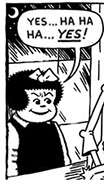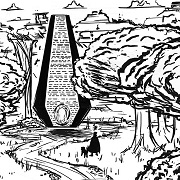|
Tuxedo Catfish posted:- No "adventuring day" -- no dailies, no Vancian casting, no healing surges, either make encounters completely discrete or have resources that refresh based on player-facing triggers ("when you kill an enemy, regain 2 uses of this power" or whatever) instead of an 8-hour rest What are the pros and cons of the “adventuring day”?
|
|
|
|

|
| # ? May 16, 2024 12:16 |
|
Tuxedo Catfish posted:Huh. If it works out to the same math I guess I'll adjust my position from "negative" to just "confused why this matters." 
|
|
|
|
DalaranJ posted:What are the pros and cons of the “adventuring day”? On the one hand, deciding whether to save resources until later and which encounters are difficult enough to justify their expenditure is a strategic decision that adds depth to the game. On the other hand, you're making that decision mostly blind which seriously limits the extent to which it's meaningful, and also it's a giant pain in the rear end and creates a significant incentive and/or psychological tendency to hold on to your cool things for bigger future problems that may not even happen. Also, "dailies" and the equivalent specifically can be a problem because they mandate at least some level of mechanically-significant timekeeping, which is fine and expected in some games, but is basically vestigial in modern D&D. If you're not actually doing anything interesting with timekeeping except that your powers refresh when you sleep (instead of once per session or once per encounter or what have you) then why link the narrative passage of time to the mechanical regeneration of abilities at all? dwarf74 posted:Pretty much so I can focus on running the game, and the players do all the math. In my experience my players usually know the rules less well than I do and any chance I get to do the math for them expedites the speed of the game, especially when I'm looking up stats that I've prepared and aren't on their character sheets, but on the other hand I've also complained about this exact thing (players not knowing / not needing to know the rules) so yeah, I could give something that puts the onus on them a shot in the hopes that it would pay off in the long run. Tuxedo Catfish fucked around with this message at 21:52 on Jun 21, 2018 |
|
|
|
DalaranJ posted:What are the pros and cons of the “adventuring day”? It mandates a certain amount of resource expenditure before stuff starts getting tense - the first few encounters are mostly there to cost the party resources (dailies/healing surges) rather than seriously threaten them, since players can always blow things like dailies and potions if they run into trouble. Encounter balance gets weird if the party use more or fewer resources on an encounter than the game is designed for them to do. An example might be the fighter power that lets them auto-damage any enemy that comes near them for a small amount - a power that gets better the more numerous the enemy are. If you have a four-encounter adventuring day, this becomes a strategic choice for the fighter's player - does this encounter look like one where I should use my crowd-killing power? On the other hand, if there's only a single encounter in the adventuring day, there's no real choice - you should use every daily you can, since they're stronger than your other powers. However, an encounter balanced to be one-of-four in the adventuring day looks very different to one that's meant to be the only encounter of the adventuring day, and the game doesn't really guide you for the one-big-encounter kind of design, they just assume you'll always be doing multiple encounters per day. There are workarounds for this sort of problem - which mostly revolve around encouraging your party not to rest as often as they'd like - but I prefer it when attrition is not a built-in assumption of the game system. If I want my adventure to have a large element of attrition or fatigue then give me optional rules to do that with, don't make it the standard. A related issue is that fighting in 4e takes a long time, so by designing around a certain number of encounters you're also designing around a certain amount of time spent fighting in any given adventure, and I always found four encounters to be longer than I'd like for a play session.
|
|
|
|
Tuxedo Catfish posted:"No GM rolling" sounds awful though No GM rolling has been great every time I've used it. It's the difference between "Hey Steve, take 27 damage" and "Hey Steve, roll to parry". It's a subtle difference, but it changes the emphasis from the monster to the character, which is a positive thing.
|
|
|
|
Just make the daily powers cost a surge point and balance around that instead of using surges to heal between fights
|
|
|
|
I am less and less interested in the whole, 4 to 8 fights a day thing, as I feel it takes what should be an exciting thing, a combat, and turns it into, I don't know, tedious grinding at best. Fights should be important, and the more fights there are, the less important each individual one is, especially if it becomes clear that 99 percent of those fights are not in fact important at all, but just exist to fill a quota, be that quota a timer until resources are replenished, or leveling up. 4E moves in the right direction in a lot of ways, fights are more interesting in general, and the time they take makes them a significant part of a days gaming, but they still often expect you to run too many of them, and they also require you to hold back from using interesting manuevers until such time as the the final fight of a scenario rolls around. This final fight has to take into account two things; one, that the characters will be worn down from previous fights, and two, that they will also likely have saved up some of their more potent abilities for this fight. So you have a situation here where the boss must be tough enough to take the full brunt of a parties power, but it also must be a reasonable enough challenge so that it can be defeated by a less well equipped team, who did not save said powers. Kill the adventuring day, suddenly you only need to balance fights for a fully capable team. Kill the adventuring day, you only need to have fights when it is important for there to be a fight. Kill the adventuring day and every fight can be a challenging boss fight rather than a tedious resource drainer and time filler. Kill the adventuring day.
|
|
|
|
remusclaw posted:Kill the adventuring day, suddenly you only need to balance fights for a fully capable team. Kill the adventuring day, you only need to have fights when it is important for there to be a fight. Kill the adventuring day and every fight can be a challenging boss fight rather than a tedious resource drainer and time filler. Kill the adventuring day. Couldn't have said it better myself.
|
|
|
|
The thing I like about the adventuring day is that by making daily powers a thing you can't use in every fight, you give the party more ablative armour so there are more steps between "A-OK" and "dead", and they have to make difficult decisions about whether to press on or fall back. The thing I don't like about it is that it takes a day -- often my plots are paced so that exciting things happen a day or so apart. The way I get around it is that anything that RAW recovers after a day instead recovers after a week or so's rest and relaxation with the PCs doing the kinds of things they enjoy doing for fun.
|
|
|
|
The adventuring day is great if you're doing a push your luck resource management game, but otherwise it doesn't make any sense.
|
|
|
|
There are basically two theories to using your dailies in 4E. As an adventurer I actually tend to stack multiple dailies onto one encounter to make it easier for everyone (known in my group as the Daily Storm), and I generally know which encounter I'm going to stack them on. I'm not blowing it all on orcs, I'm waiting for Orcamungus or a fight where there's clearly more to deal with than one would expect, because I've played D&D before and I know how this works. This fight does not necessarily occur at the end of the adventuring day. Sometimes you do not get four fights in an adventuring day. So there's an element of using experience effectively. There's also "I use one daily per fight." You pace yourself and try to use the best daily to suit the occasion. Keep in mind now that generally 4E plays as a game where if you're going to use a daily, you are either going to lead with it (if it's an encounter long, free bonus actions for the party, or a big nuke), or you are going to pop it when its specific and not likely to repeat conditions arise regardless of what else is going on, which is especially true of heals and off-turn actions. There's not really a "SHOULD OR SHOULDN'T I USE A DAILY?" choice being made on your every turn in 4E. The adventuring day is also important because smart play can keep a character with fewer healing surges from getting into a real tight spot on their third or fourth encounter. If you are super against the adventuring day, which I'm not saying is the wrong idea, the easiest (though not necessarily best) fix is to make every fight much harder and let everyone use dailies like encounters. Other ideas: The Kids Love Card Games, Make It a Card Game: Your dailies are a deck or multiple decks of cards that you draw from before initiative is rolled. Provisionally, doing certain things lets you draw more cards. Beware ye the terrors of the Warp: Using your dailies whenever is fine, but over-using your dailies creates a Perils of the Warp situation (best for magic-oriented stuff) The Third Law of Dailies: Once the party spends dailies equal to the number of party members, everyone gets their dailies back, but the monsters also get their dailies back, or another use, or they get bonus actions. We've all got places to be!
|
|
|
|
D&D 4E is inherently a game that assumes you use some form of adventuring day much like it is a game that assumes you'll do a lot of fighting. It's not the right system for nonviolent diplomatic resolution and world simulation, and it's not the right system for fighting important isolated battles. I'd rather play to its strengths or else look for a game that plays to the strengths I want.
|
|
|
|
My Lovely Horse posted:D&D 4E is inherently a game that assumes you use some form of adventuring day much like it is a game that assumes you'll do a lot of fighting. It's not the right system for nonviolent diplomatic resolution and world simulation, and it's not the right system for fighting important isolated battles. I'd rather play to its strengths or else look for a game that plays to the strengths I want. What makes you say this? Particularly when Gamma World 7E (and to a lesser extent, Strike!) exist.
|
|
|
|
It's funny you should mention Strike!, cause I was just thinking of it - and I'll admit I only played one test session with my group, but what happened was about the same thing I'd expect if you ran 4E without dailies and full recovery after every combat, i.e. everyone would more or less mechanically fire off their encounter powers in descending order of oomph, then spam at-wills. I just think if you want to do isolated interesting battles, you'll have to build the system that does that from the ground up, and it's gonna have a lot different stuff than just at-will and limited use abilities.
|
|
|
|
The main issue with killing the adventuring day is that it also kills a lot of the variance you can have in the difficulty of individual fights: an "easy" fight within the context of an adventuring day is still important because it still challenges the players to get through it with a minimum amount of resource expenditure, since any "inefficiencies" will carry over to the next of the fights within the same day. Without an adventuring day, practically every fight has to be dangerous to the group. To put it another way, look at this within the context of an MMO raid: WoW doesn't have an adventuring day, so every fight begins with everyone at full health and all special abilities at the ready, which means that every single fight has to be capable of wiping the raid, and all of the difficulty and expression of player-skill happens within the bubble of each individual engagement. If you don't have a problem with this, then go ahead and kill the adventuring day, but it's an issue that one needs to be aware of. EDIT: To take another angle on my MMO analogy: suppose you have a boss that's relatively easy to beat, but then there's a lot of trash leading up to him. The trash isn't particularly damaging, but they need to be cleared/killed quickly, because the respawn timer is tight. That's kind of like an adventuring day, because the skill of the raid is expressed not just in what they do within each individual engagement, but also how they handle the entire 30 minute window to clear trash + kill the boss. You CAN make the boss easy, because if the raid can't kill trash efficiently, then they won't have time to kill the boss anyway. Projecting this back onto D&D, you CAN have five identical fights against basic kobolds, and the difficulty will virtually ramp up with each successive one, because even if the Fighter only takes one hit per fight, by the fourth hit, they might not have any healing left available to them, which means the fifth is not to be taken lightly anymore. gradenko_2000 fucked around with this message at 14:47 on Jun 22, 2018 |
|
|
|
gradenko_2000 posted:Without an adventuring day, practically every fight has to be dangerous to the group. This was an issue I found when running Strike, because unless enemies are seriously dangerous, then the fight isn't worth having. And since fights are what the game does, that means you have to always be fighting dangerous enemies.
|
|
|
|
I kinda thought this whole "adventuring day" thing was solved a long time ago by decoupling rests from actual days.
|
|
|
|
If a fight doesn't have the potential to wipe the group, you shouldn't be fighting it, because fights without that capability are just boring trash fights that only exist to waste time and maybe grind a couple of surges off of you in preparation for the knockout punch. I'd much rather play with artificially reduced resources and just fight the big fights instead of clogging up playtime with disposable trash fights that only exist to reduce my resources. Disposable trash packs are times for minigames or skill checks or even just roleplaying your way past guard patrols. When you get down to it, my ideal system is probably something like Dungeon World for everything but boss fights, and then 4E for boss fights.
|
|
|
|
Serf posted:This was an issue I found when running Strike, because unless enemies are seriously dangerous, then the fight isn't worth having. And since fights are what the game does, that means you have to always be fighting dangerous enemies. How is that an issue though? DnD is about high stakes, and being heroes. Its not especially heroic to fight something that isn't dangerous. What's the point of a fight that isn't dangerous? What does it bring to the story? I'd much rather have fewer encounters but make sure each encounter matters.
|
|
|
|
TheCog posted:How is that an issue though? DnD is about high stakes, and being heroes. Its not especially heroic to fight something that isn't dangerous. The point is that the fight isn't dangerous now, but it will be dangerous later, because you're not getting a respite between all of these sequential fights, and how well you do in the early fights can also act as an influence on how dangerous the later fights are, indeed possibly determining how many fights you can fight before poo poo starts getting dangerous in the first place.
|
|
|
|
TheCog posted:How is that an issue though? DnD is about high stakes, and being heroes. Its not especially heroic to fight something that isn't dangerous. It's not even totally a bad thing, imo. It's just hard to get into the groove for, as some fights should be easier and some should be harder. Also characters in Strike are incredibly powerful, and to challenge them in the slightest you need to pump up the damage and status effects, and that just turns the fights into a slog.
|
|
|
|
The other major factor of a Tabletop fight is time. Resolving actions 1-by-1 rapidly extends the fight time for even a single round to a huge degree. 'Nothing' fights don't challenge the party but they take the same amount of time per round as a challenging one. if the system for resolution was different, maybe the options for fight composition or resolution could be more varied.
|
|
|
|
Torchlighter posted:The other major factor of a Tabletop fight is time. Resolving actions 1-by-1 rapidly extends the fight time for even a single round to a huge degree. 'Nothing' fights don't challenge the party but they take the same amount of time per round as a challenging one. if the system for resolution was different, maybe the options for fight composition or resolution could be more varied. In theory I think skill challenges were intended to fill some of that in-between space, but we all know how those worked out. In 4E as it is, the concept is that there are no 'nothing' fights - non-climactic fights still have stakes in terms of how drained you are for the climactic fight. I'll agree that's not for everyone, but deciding if your combats are about attrition or all-or-nothing is one of those high-level design goals that doesn't have a right or wrong answer, just individual tastes. The important thing is that all the individual components reinforce the design goals and that there sufficient guidelines as to how to use the tools to build encounters/adventures in alignment with those goals. I feel it's that last point where 4E dropped the ball. Those first few published adventures went from utter poo poo to just not very good, and that was a terrible tone to set early on and didn't teach DMs how they should be approaching the game, given how vastly different it was from the last edition. The Dungeon Master's Guides were pretty good by and large, but I think they would have benefitted immensely from showing how to prep a complete day of encounters from start to finish, using every tool in the toolbox. To me this would be something like: 1. In less than eight hours something bad is going to happen. If the players don't even attempt to stop it (aka the climactic encounter) then something even worse happens. 2. Sketch out at least three encounters beforehand which thematically and mechanically build towards the climactic encounter. 3. Each encounter should have: 3a. The opportunity to use skills beforehand to gain a superior starting condition, or mitigate a really terrible starting condition. 3b. Terrain features 3c. A varied mix of opposition, some of whom will reappear in the climactic encounter (or least abilities are repeated if not actual foe types) 3d. A starting action advantage towards the opposition, exact ratio varies by party optimization / tier 3e. The opportunity to use skills during to mitigate traps/terrain features/gain an advantage 3f. An alternate (or optional additional) victory condition beyond clearing the field of opposition 4. After the encounter, there should be a choice to make after that has consequences for later encounters / after the day Attrition models don't need "trash" fights in the classic sense of the word, but those are (to varying degrees) a thing of the past in MMOs as well. They do need fights where the consequences aren't high-level success or failure, yet are still engaging. I think 4E offers the tools to make that work, but they always did a middling at best job of showcasing them.
|
|
|
|
dwarf74 posted:I kinda thought this whole "adventuring day" thing was solved a long time ago by decoupling rests from actual days. What are the rules for this?
|
|
|
|
Gort posted:What are the rules for this? Tell your players that you're not going to give them an Extended Rest until your say so, regardless of what that means within the context of the in-game narrative. If you want something a little more concrete: you cannot benefit from the effects of an Extended Rest until you hit a "milestone" (which is at the DM's discretion anyway, but eh). If you want something even more concrete than that: an Extended Rest requires a week's worth of completely uninterrupted downtime at a luxury inn or similar accommodation.
|
|
|
|
You get an extended rest every X encounters, good luck nerds
|
|
|
|
Cthulhu Dreams posted:The adventuring day is great if you're doing a push your luck resource management game, but otherwise it doesn't make any sense.  D&D has a pretty clear identity crisis when it comes to this issue. Thanks for all the responses. Now that I'm getting Socratic in multiple threads I'm going to have to start a google doc or something.
|
|
|
|
kaynorr posted:To me this would be something like:
|
|
|
|
Is the information current in the OP as far as running the game with the best regarded modifications to make the fights interesting/quicker? (MM3 math, free feat taxes, inherent bonuses) etc, or is there something else I should be considering or another list to reference?
|
|
|
|
Banana Man posted:Is the information current in the OP as far as running the game with the best regarded modifications to make the fights interesting/quicker? (MM3 math, free feat taxes, inherent bonuses) etc, or is there something else I should be considering or another list to reference? I wrote this for myself, but I think it's about the same as the OP: https://songoftheblade.wordpress.com/2015/12/20/how-to-get-started-with-dd-4th-edition-without-ddi/ This is a somewhat more ambitious change: https://songoftheblade.wordpress.com/2017/05/07/simplified-modifiers-for-dd-4e/
|
|
|
|
kaynorr posted:To me this would be something like: This guide is amazing, and I am definitely taking notes on it.
|
|
|
|
X-post in the GM advice thread!
|
|
|
|
Subjunctive posted:X-post in the GM advice thread! Hell, if there's a game design megathread you could probably X-post it there, too. Its one thing to consider that on the DM level for currently existing systems, but seeing that process through a systematic lens can be super helpful in its own right.
|
|
|
|
By all means share it, thought that list is fairly specific to 4E, as it implies an attrition-based model with terrain, a skill system, etc. What I think is more generically applicable (as mentioned) is the concept of being systematic and reductionist when it comes to thinking about encounters/adventures in any sort of medium-crunchy game. I'm thinking here of stuff like 4E, Strike!, Shadowrun, Exalted, Fragged Empire. Games that do a good job (or want to do a good job) of being primarily about combat, having systems to support it. One of my long-standing qualms with RPG design is that I think that there are a number of games which are actually better designed than we give them credit, except for the fact that they don't go nearly far enough in explaining how to build content for it. One particularly pointless project in my mind is to write a couple of Shadowrun 3E adventures that highlight the system at its best. Part of it is (was, back in the 90s) an issue that the supplement treadmill rewards player-facing content more than GM-facing, so it's hard to pitch a book that is not just GM-facing, but mechanically super crunchy in a way that might turn people off. Another part is that published adventures (outside of Paizo) isn't the market it used to be so there is less opportunity for a game line to demonstrate "this is how you should be doing it" by releasing an ur-campaign which is actually well-playtested and designed. And finally, some of these medium crunch games just AREN'T well designed, such that the underlying math/mechanics aren't a good foundation. 4E doesn't make most of those mistakes, and was so close to being amazing in that regard. Had we gotten a real 4.5E with hybrids properly balanced, skill challenges iterated on a few more times, it would have been really something. But at this point we're pretty far afield from the thread, though I'd be happy to talk people's ears off in the general design thread about these concepts.
|
|
|
|
Yeah, I must say it always grinds my gears when a game has put the time in to make charts and guidelines for the DM to use in encounter creation, then straight up ignores them in their own pre-written adventures. Like in Keep on the Shadowfell for 4e, there's a level 6 encounter for level 1 PCs which straight-up killed one of my party when we were new players. Shadow of the Demon Lord did this as well, like the first combat encounter in their big adventure path is against a pair of gangsters who severely out-gun the party going by the charts in the rules, and that's before you start taking into account the issues you'll have with new players getting to know new characters. Write the guidelines for encounters and treasure first, then follow them when making your adventures, people. Gort fucked around with this message at 18:34 on Jun 26, 2018 |
|
|
|
Gort posted:Yeah, I must say it always grinds my gears when a game has put the time in to make charts and guidelines for the DM to use in encounter creation, then straight up ignores them in their own pre-written adventures. Like in Keep on the Borderlands for 4e, there's a level 6 encounter for level 1 PCs which straight-up killed one of my party when we were new players. Shadow of the Demon Lord did this as well, like the first combat encounter in their big adventure path is against a pair of gangsters who severely out-gun the party going by the charts in the rules, and that's before you start taking into account the issues you'll have with new players getting to know new characters. Keep on the Shadowfell did a huge disservice to the launch of 4th Edition, to the point where I think you can legitimately point to it and say "And this hosed everything over from the jump". Stories about how badly groups got wrecked by Irontooth are great and all, but that should have (at the very least) been kept as an optional encounter off the critical path with signposting to the effect of "This may very well TPK you, proceed at your own risk". That adventure should have been literally X number of balanced encounters (where X is somewhere between 0 and 30) which would take a group to level 3 with exactly the amount of XP and treasure they should have had. If that's too much content, then make it for levels 1-2 or rethink your loving progression curve. There really was no excuse for it as the flagship adventure for the flagship game in the industry, which was more likely than literally anything else to be played by people with no experience or familiarity whatsoever.
|
|
|
|
Was this one of those cases where the adventure was written in parallel with the game system, and didn't get fully updated before release?
|
|
|
|
Subjunctive posted:Was this one of those cases where the adventure was written in parallel with the game system, and didn't get fully updated before release? I don't know, but a level 6 encounter for level 1 characters should set off anyone's alarm bells, especially in the adventure you're writing to be the very first one people play in your system. Generally speaking the first adventure people play should be an easy one, to ease them into the system and get them hooked on the feeling of winning. Then you can introduce the deadly challenge tension factors later, rather than crushing people right out of the gate. The other thing that bugged me about the 4e pre-writtens was the dismal ratio of plot to encounters. Like you get a few suggested hooks at the start, an encounter or two on the way to the dungeon, then forty encounters in the dungeon, then you meet the baddie and kill him. When I write 4e adventures it's more like a hook, three encounters, then a resolution to that hook. One of 4e's great advantages is that it's really easy to come up with combat encounters. Like, turn to the orcs page, grab one different orc per party member, put them on some interesting terrain and you're done, perfectly decent, balanced combat encounter, and it took you about a minute flat to make it. What I'd pay a professional game designer for is interesting stuff going on around the mechanical bones of encounters, dailies and healing surges. Give me interesting locations, mysteries, memorable NPCs, puzzles, cool traps, all that good poo poo. Unfortunately in the 4e pre-writtens, that poo poo is extremely thin on the ground - they spent all their time on the easy, formulaic parts of the game, and none on the stuff that actually requires imagination. As a result, you end up with a slog of combats. Often you get to fight the same monster types in multiple rooms in the same area. On a good day (IE: When it's not an ogre whose amazing trick is "hit you twice instead of once" or a Monster Manual 1 monster who does D6+2 damage at level 23) 4e's monsters are the best in the business, with cool gimmicks you can work around tactically and make sense with the themes of the monster. But not even they can prevent the sighs of frustration when you defeat five orcs and a troll then open the door to find four orcs and a troll shaman waiting for you.
|
|
|
|
kaynorr posted:Keep on the Shadowfell did a huge disservice to the launch of 4th Edition, to the point where I think you can legitimately point to it and say "And this hosed everything over from the jump". That whole HPE adventure path is dire. 7 of them are among the worst adventures ever written, IMO. (H2 and P2 are good enough, for what they are worth, and the little micro-setting those two include is solid. Nevertheless.) quote:Stories about how badly groups got wrecked by Irontooth are great and all, but that should have (at the very least) been kept as an optional encounter off the critical path with signposting to the effect of "This may very well TPK you, proceed at your own risk". quote:That adventure should have been literally X number of balanced encounters (where X is somewhere between 0 and 30) which would take a group to level 3 with exactly the amount of XP and treasure they should have had. If that's too much content, then make it for levels 1-2 or rethink your loving progression curve.
|
|
|
|

|
| # ? May 16, 2024 12:16 |
|
Also are this point is there a consensus on what the best and worst destined classes are? I remember hearing monks weren’t do great at one point but didn’t play the game enough to understand why
|
|
|


































